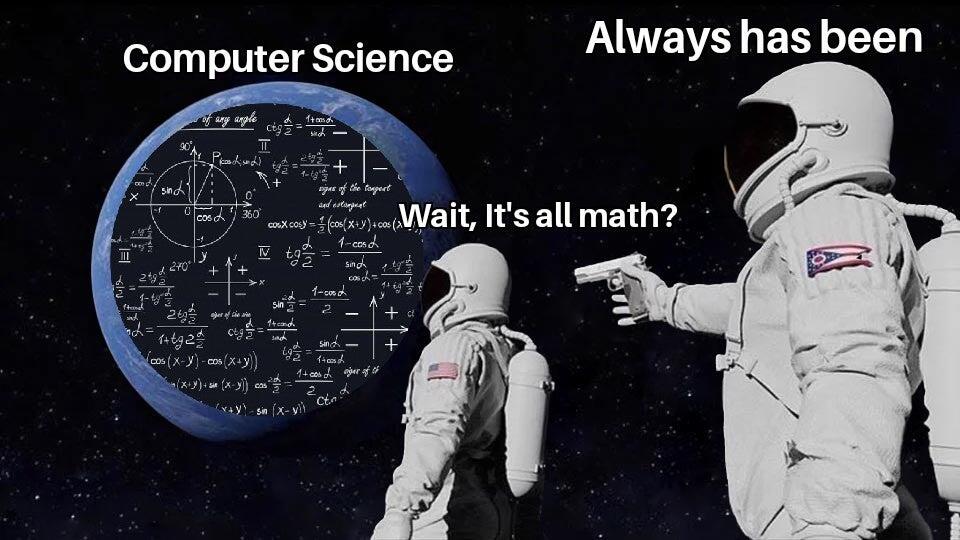🌊 Blue Oceans, Network Effects & Wutang
10 October 2021
Welcome back to the Week That Was series highlighting things from the interwebs which are interesting, noteworthy and/or probably worth your time.
Articles📝, Tweet(s)📱, Videos🎥, Charts 📈 all fair game with or without attendant commentary.
This week is defintely a visual edition.
🦄📊 Unicorns
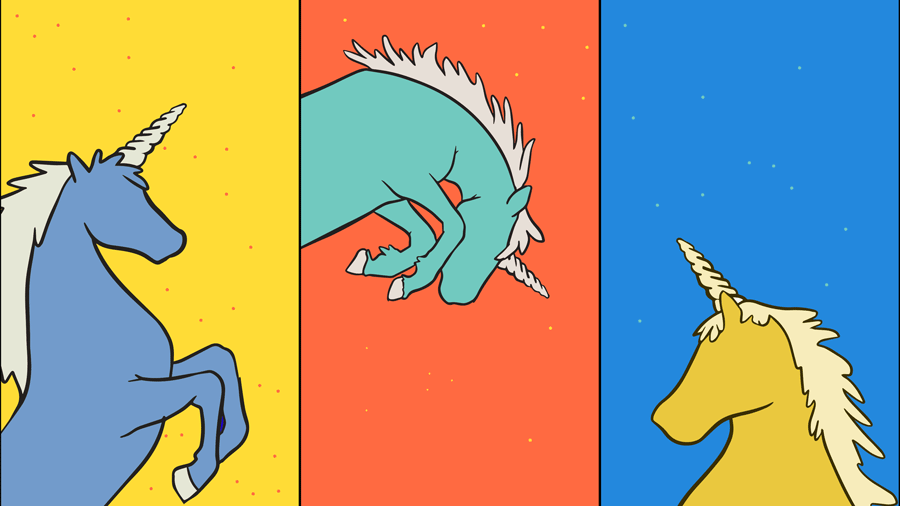
Crunchbase maintain a 📝Private Unicorn Board where they track companies which enter the billion dollar valuation club.
In 2021, the pace of new unicorns has increased considerably, almost reaching 1,000 current private unicorns.
Incredibly, they note:
We started 2020 with one new unicorn every two to three working days. By September of 2020 that jumped to one per working day. The pacing in 2021 has sprung to two or three per working day, with over 400 companies joining the board this year so far.
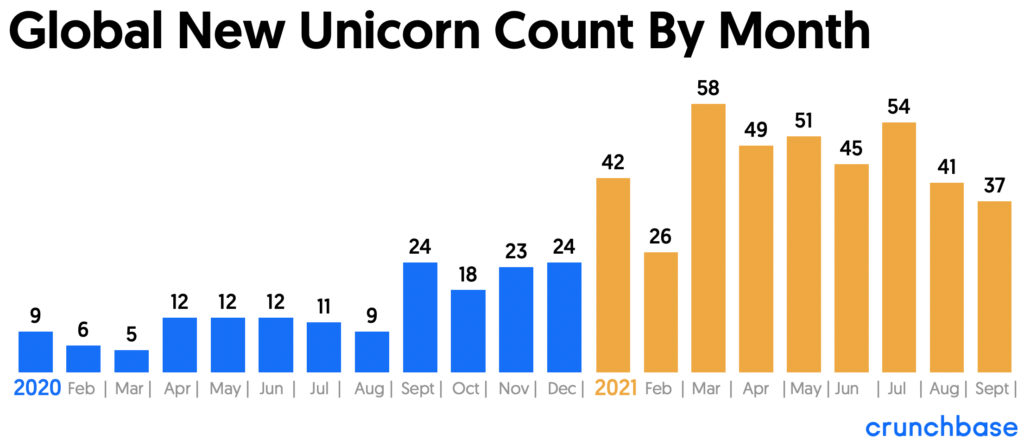
Valuations also ballooned through the course of 2020, with the board boosting it’s value by $1.4 trillion in under a year to $3.4 trillion. The IPOs have been getting distinctly larger.
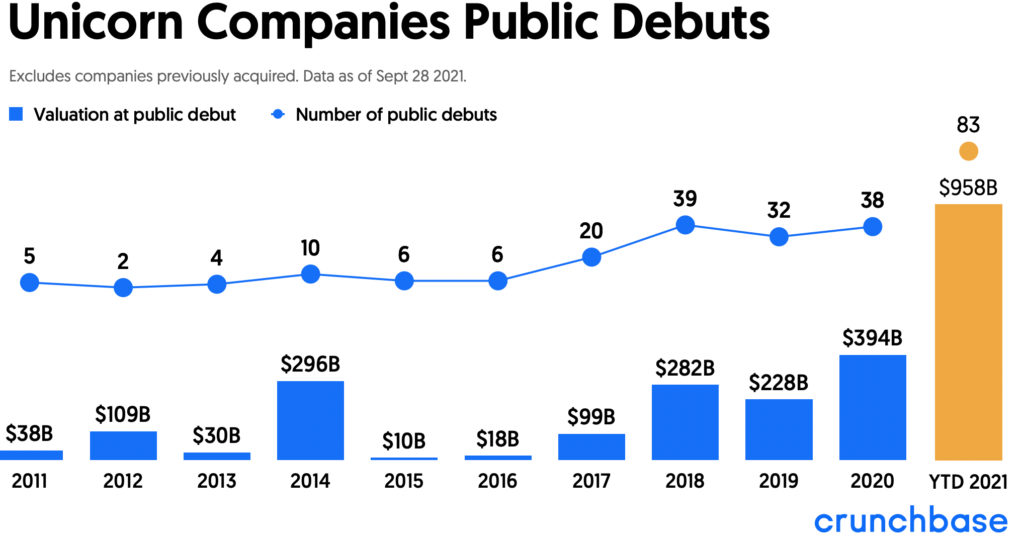
What’s becoming increasingly clear though is that, 📚per Startup Genome, the next unicorn could come from anywhere.
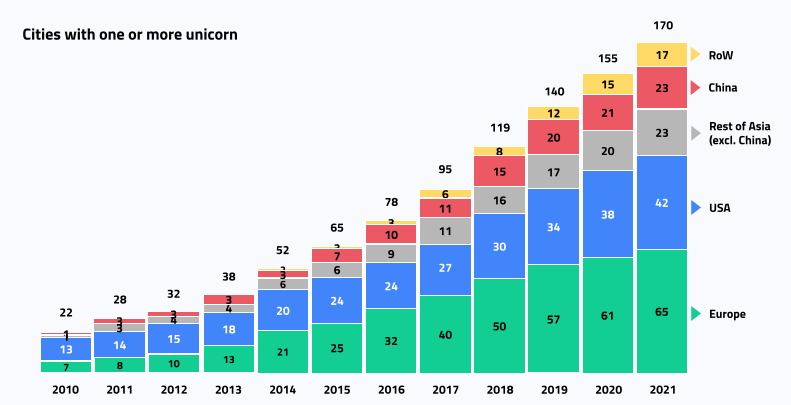
💰🏢 Brand Value
The World’s 100 Most Valuable Brands in 2021.
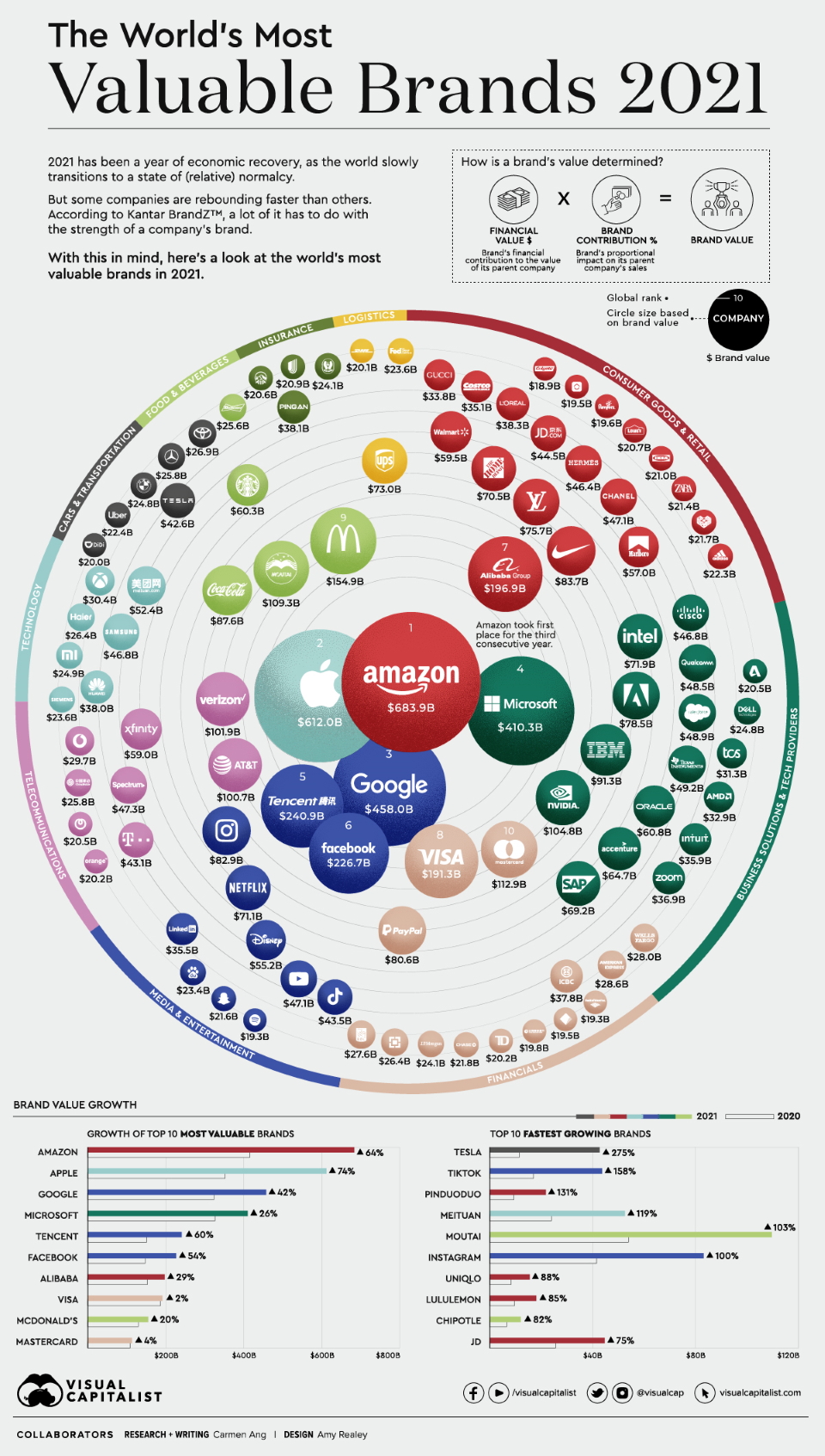
Insights highlited by Visual Capitalist on some over-arching factors have stood out as key contributors to brand value growth:
1. The Big Get Bigger
Starting “strong” can give brands an edge. This is because growth rate is closely correlated with high brand equity. In other words, a strong brand will likely see more growth than a weaker brand, which might explain why companies like Amazon and Apple have been able to hold their place at the top for several consecutive years.
Keep in mind, this doesn’t account for industry disruptors. An innovative company could come out of the woodwork next year and give the Big Tech giants a run for their money.
2. Marketing Makes a Difference
The right strategy can make a difference, and even smaller brands can make a splash if the message is impactful. Brands with emotional associations, like pride or popularity, tend to see that translate into brand value growth.
Companies like Nike and Coca-Cola have mastered the art of emotional advertising. For instance, in May last year, Nike released a video urging consumers to stand up for equality, in a video titled, “For Once, Just Don’t Do It.”
3. Smart Investment
It’s not just about developing an effective marketing strategy, it’s about executing that strategy, and continually investing in ways that perpetuate your brand message.
For instance, innovation is the core value of Tesla’s brand, and the electric car company walks the walk—in 2020, the company spent $1.5 billion on R&D.
🎲 Real Probabilities
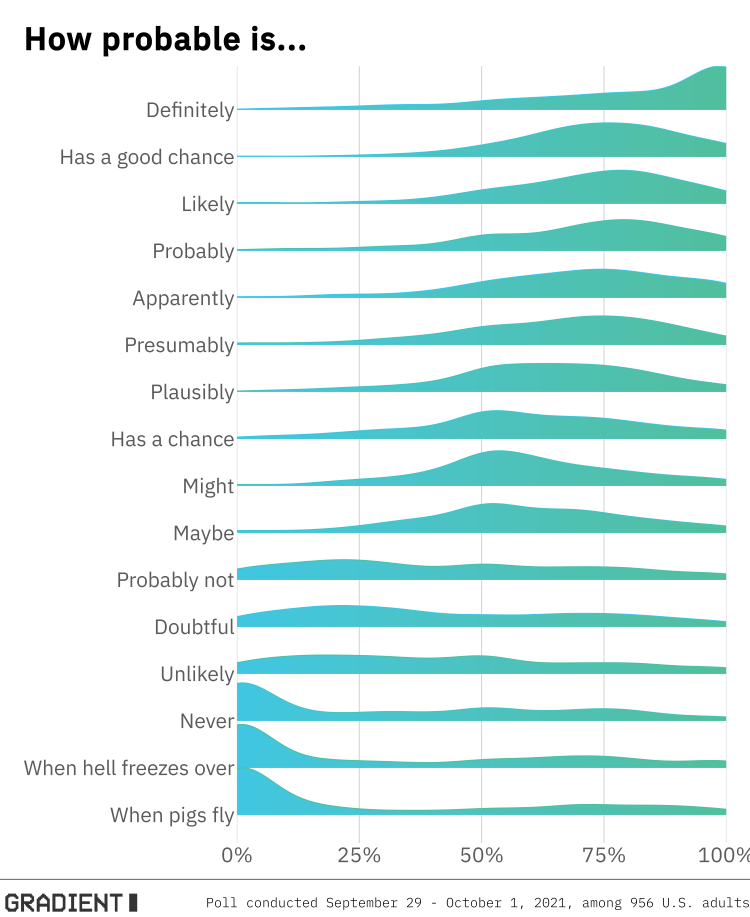
🕸️ Network Effects
Network effects are at the heart of what 📝Azeem Azhar calls the unlimited company in his new book 📖Exponential.
Even though network effects have driven as much as 70% of value creation in tech since 1994, founders still find themselves in the dark when it comes to leveraging their power.
To uncover how network effects shape businesses, Azeem chats to expert, James Currier, Partner at NFX, an investment firm and author of the 📝The Network Effects Bible
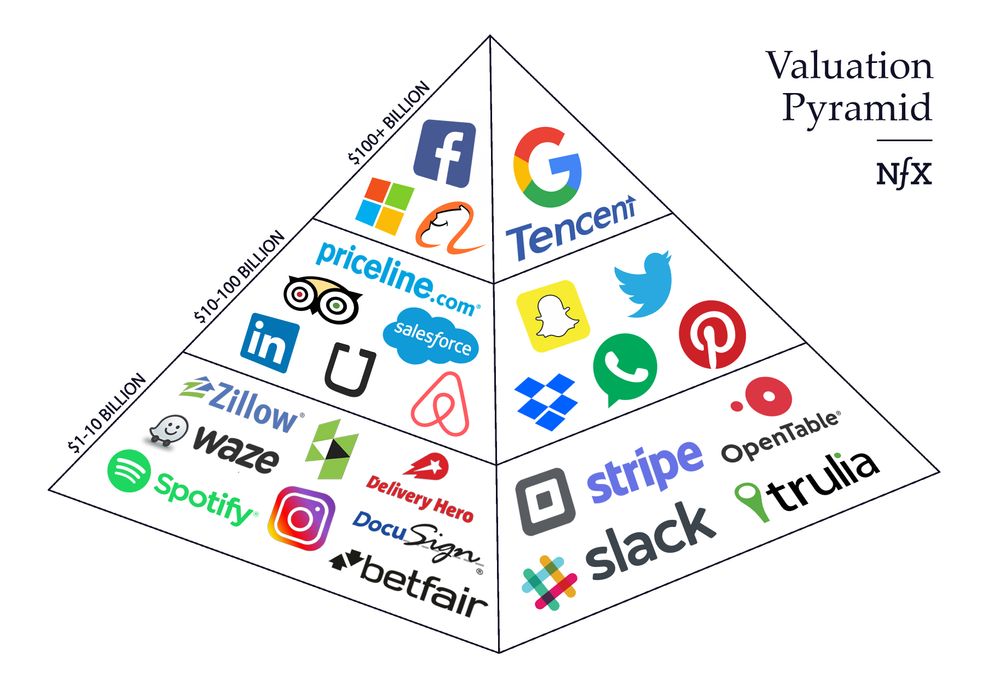
If you look at the list of top 13 market cap companies in the world in 2004, the only network effect business that was there was Microsoft. And they are still there today. Of the 13, nine of them are now network effect businesses.
🎨 Extinguished

Extinguished, Miles Johnston, Graphite on Paper, 2021
🎙️📹 Enter The Wu
The evolution of Lex Fridman’s public persona has been fascinating to track over the last few years. I started listening to his podcast when it was focused on AI, Computer Vision, Machine Learning and Technology more broadly - before it evolved it’s interviewee based dramatically while Lex’s profile got massive via associations with the likes of Joe Rogan and Elon Musk.
I’m glad he’s gone on the journey however as it’s resulted in unlikely interactions like this one where he talks Kung-Fu, God, Life & Death with rapper, producer, filmmaker, actor, writer, philosopher, and the mastermind of the legendary hip hop group Wu-Tang Clan RZA.
🦉 Advice from 20 Years of Software Engineering

Justin Etheredge 📝recently shared a blog-post called 20 Things I’ve Learned in my 20 Years as a Software Engineer which had some useful take-aways shared below - some of which apply much more broadly than writing software.
His list, which you can dig into further on his post. I’ve taken a line or two from each sub-topic, but he goes further.
1. I still don’t know very much
…you can spend decades in your career, and still have a huge knowledge gap compared to someone who has also spent decades in a seemingly similar role. The sooner you realize this, the sooner you can start to shed your imposter syndrome and instead delight in learning from and teaching others.
2. The hardest part of software is building the right thing
You can design the most technically impressive thing in the world, and then have nobody want to use it. Happens all the time.
3. The best software engineers think like designers
Great software engineers think deeply about the user experience of their code.
4. The best code is no code, or code you don’t have to maintain
Engineering teams are apt to want to reinvent the wheel, when lots of wheels already exist.
5. Software is a means to an end
If you really believe that software is subservient to the outcome, you’ll be ready to really find “the right tool for the job” which might not be software at all.
6. Sometimes you have to stop sharpening the saw, and just start cutting shit
Some people tend to jump into problems and just start writing code. Other people tend to want to research and research and get caught in analysis paralysis. In those cases, set a deadline for yourself and just start exploring solutions.
7. If you don’t have a good grasp of the universe of what’s possible, you can’t design a good system
If you don’t understand what is possible and what is available in a given ecosystem then you’ll find it impossible to design a reasonable solution to all but the most simple of problems.
8. Every system eventually sucks, get over it
“There are only two kinds of languages: the ones people complain about and the ones nobody uses”. - Bjarne Stroustrup
9. Nobody asks “why” enough
Take any opportunity to question assumptions and approaches that are “the way things have always been done”.
10. We should be far more focused on avoiding 0.1x programmers than finding 10x programmers
The only way someone can be a 10x programmer is if you compare them to 0.1x programmers. Someone who wastes time, doesn’t ask for feedback, doesn’t test their code, doesn’t consider edge cases, etc…

11. One of the biggest differences between a senior engineer and a junior engineer is that they’ve formed opinions about the way things should be
I’d rather someone give me opinions that I violently disagree with than for them to have no opinions at all
12. People don’t really want innovation
People talk about innovation a whole lot, but what they are usually looking for is cheap wins and novelty.
13. Your data is the most important part of your system
Just remember, your data will likely long outlive your codebase.
14. Look for technological sharks
Old technologies that have stuck around are sharks, not dinosaurs. They solve problems so well that they have survived the rapid changes that occur constantly in the technology world.
15. Don’t mistake humility for ignorance
Never assume that just because someone isn’t throwing their opinions in your face that they don’t have anything to add.
16. Software engineers should write regularly
Writing helps you think about your problems, and helps you communicate those more effectively with your team and your future self
17. Keep your processes as lean as possible
Stay lean on process until you know you need more. Trust your team and they will deliver.
18. Software engineers, like all humans, need to feel ownership
Give a group of passionate people complete ownership over designing, building, and delivering a piece of software (or anything really) and amazing things will happen.
19. Interviews are almost worthless for telling how good of a team member someone will be
No one is going to tell you in an interview that they are going to be unreliable, abusive, pompous, or never show up to meetings on time.
20. Always strive to build a smaller system
There are a lot of forces that will push you to build the bigger system up-front. You learn so much as you’re building a system that you will end up iterating into a much better system than you ever could have designed in the first place.
🌊 Epic Games’ Blue Ocean
Theo Priestley’s writeup on how 📝Epic Games Metaverse Is A Blue Ocean Strategy At Work.
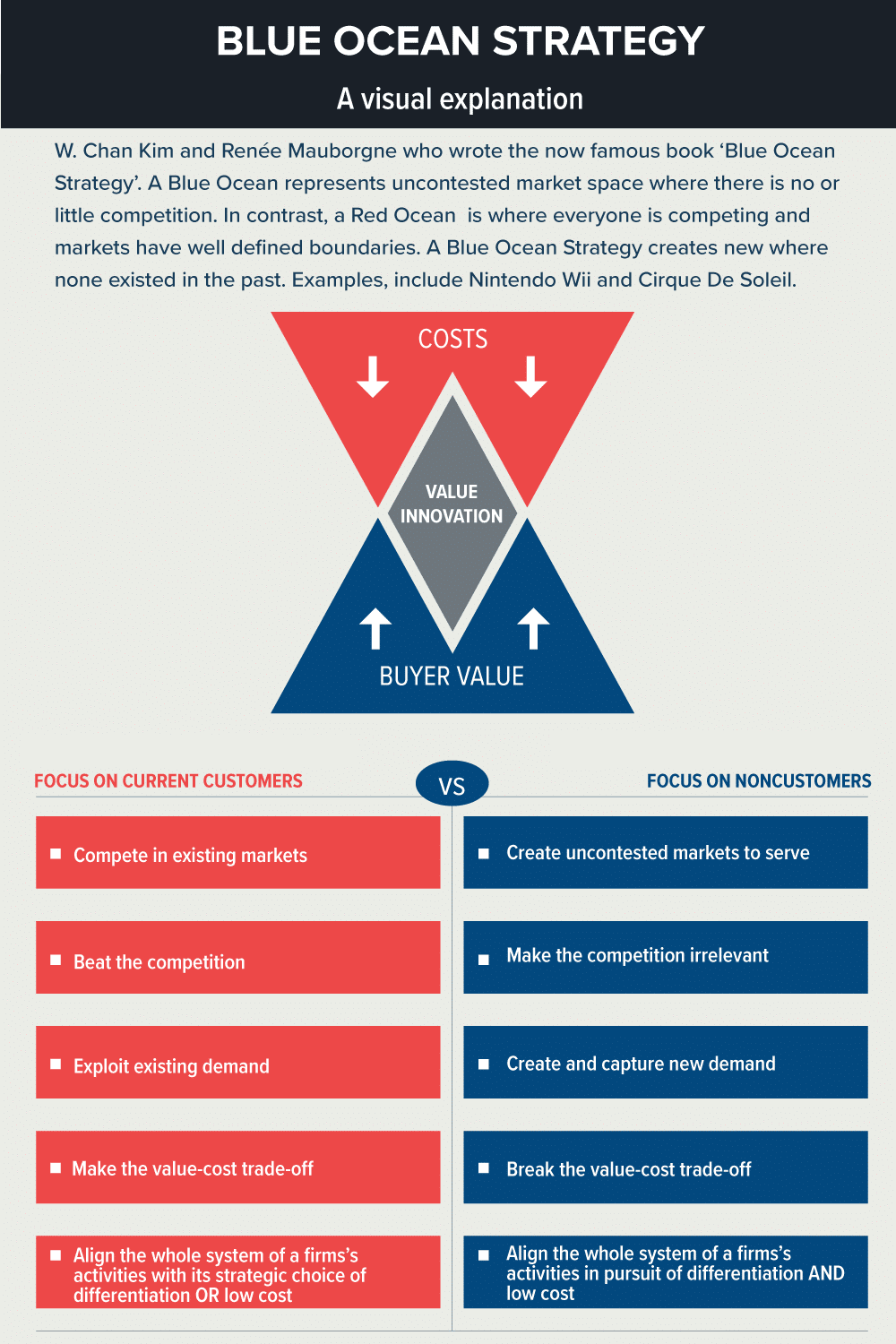
💉📊 Pfizer Efficacy
We’re getting more and more information as vaccines continue to rollout or have been in populations for a longer period of time. Important emerging finding around the efficacy of the Pfizer mRNA vaccine.
Efficacy of Pfizer in protecting from COVID-19 infection drops significantly after 5 to 7 months. Protection from severe infection still holds strong at about 90% as seen with data collected from over 4.9 million individuals 📚by Kaiser Permanente Southern California.
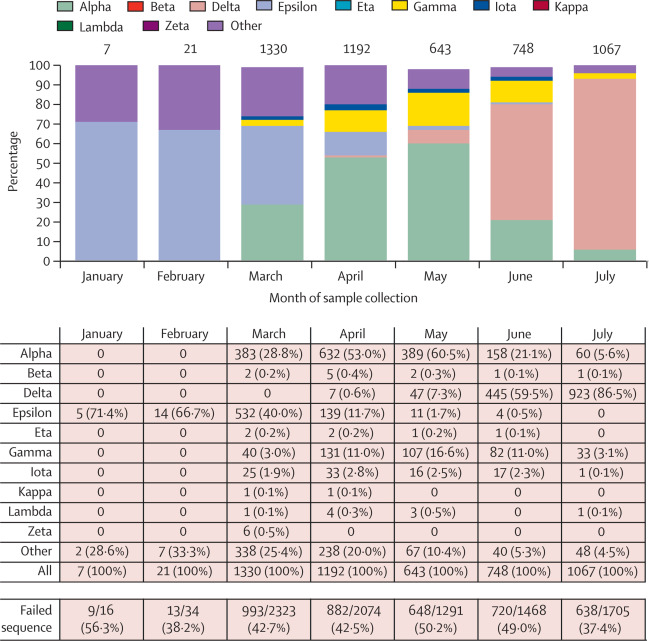
Critically, if you look at Figure 2b there is no significant drop in protecting against hospital admissions over the length of the study at all, which is very promising.

🧾💵 Pandora
A 📰simple guide to the Pandora Papers leak & How big the latest leak actually is

The Pandora Papers are 11.9 million leaked documents (comprising 2.9 terabytes of data) that were published by the International Consortium of Investigative Journalists (ICIJ) beginning on 3 October 2021. The news organisations of the ICIJ described the document leak as their most expansive exposé of financial secrecy yet, containing documents, images, emails and spreadsheets from 14 financial service companies, in nations including Panama, Switzerland and the UAE, surpassing their previous release of the Panama Papers in 2016, which had 11.5 million confidential documents.
https://en.wikipedia.org/wiki/Pandora_Papers
👩💻🧮 Sum Loop
Seen on LinkedIn
A reminder of why you take math, stats and other numeracy courses when you do a computer science degree
🍃🔋 Wind Energy
Countries that produce the most energy from wind
💬 Deep Cuts
“Waste no more time arguing about what a good man should be. Be one.” ― Marcus Aurelius, Meditations
🎨 Nemesis

Nemesis, Maldha Mohamed, Oil paint on wood, 2021
📸 One More Thing
Seal-mounted camera recovered after 3 years on N.S. ocean floor yields hours of video.
📧 Get this weekly in your mailbox
Thanks for reading. Tune in next week. And please share with your network.
Links The Week That Was Pickings
048211e @ 2021-10-10

